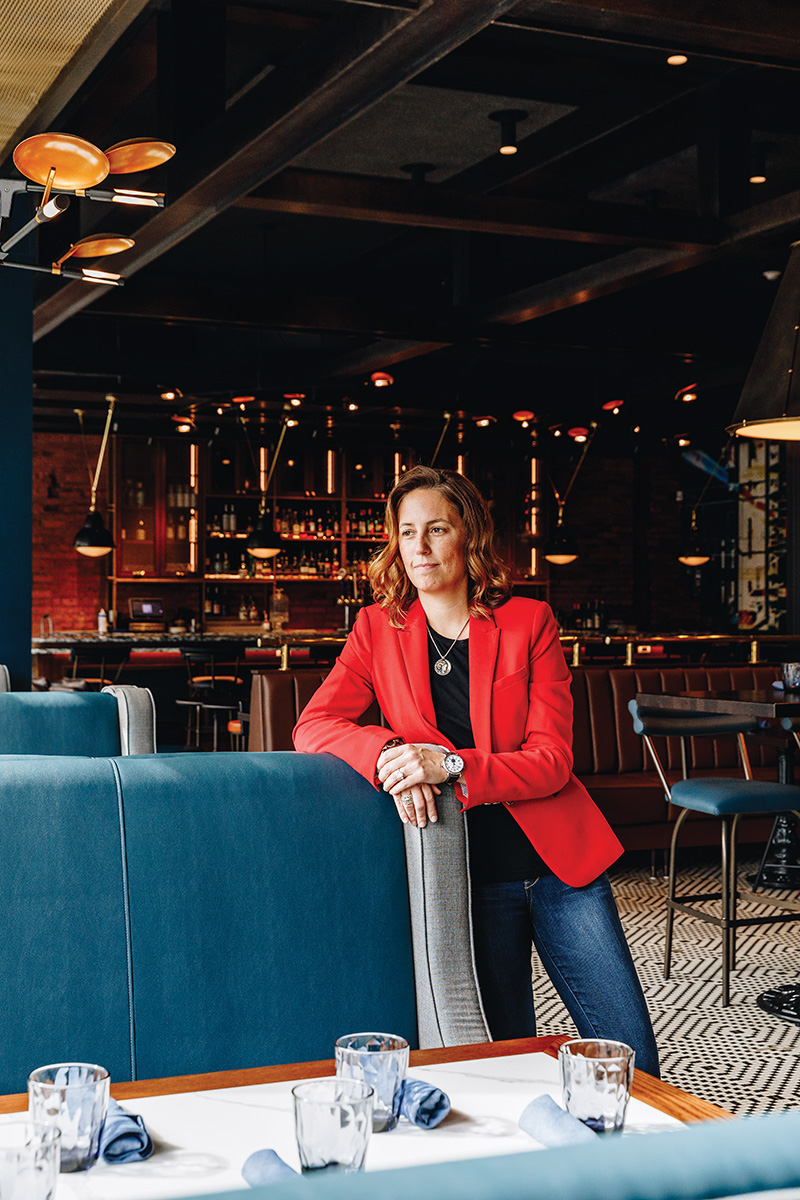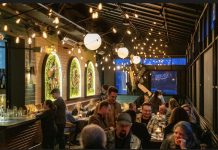
If you’re following the statistics, the state of our nation’s restaurant industry can be disheartening. As of September, staffing levels at bars and restaurants across the country were nearly 2.5 million jobs below the peak before the pandemic — that’s more job losses than any industry has experienced since the coronavirus outbreak. In a survey released by the National Restaurant Association, nearly 100,000 restaurants have closed either permanently or in the long term, and 40 percent of restaurant owners say it’s unlikely that their restaurant will still be in business by March without federal intervention.
Locally, closed restaurants include establishments that were just barely getting by pre-pandemic, chains that opted to cut their losses on less-frequented locations, newcomers that just couldn’t find their footing amid challenging times, and longtime staples whose name recognition wasn’t enough to sustain them. Blue Grill, Andiamo’s Livonia eatery, Magnet, and Wolfgang Puck Steak are among a growing list of shuttered spots in the area.
But something far more uplifting is beginning to take shape on metro Detroit’s food and beverage scene, and that’s the number of restaurant openings emerging across town. This also-growing list offers the thread of optimism needed to envision a healthy future for our dining industry.
It would seem illogical for any entrepreneur to open a restaurant during a global pandemic. But the fact of the matter for some restaurateurs — if not most — is that the decision to open the doors of a new space past March was purely coincidental. No one could have predicted that a lethal pathogen would threaten the global food economy as we know it. Not even a dystopian doomsday prepper could have seen it coming. Likewise, food entrepreneurs who spent months, some even years, planning their next big restaurant projects could never have planned for the crisis. And with their best-intentioned, well-thought-out eateries well underway, postponing an opening at a time when the future is indefinitely uncertain could do more harm than good.
Such was the case for Holly McClain, owner of Olin Bar & Kitchen, which opened in downtown Detroit in September. McClain, albeit as an adjacent bystander, witnessed the tremendous amount of effort it takes to open a new restaurant firsthand pre-pandemic. Over the past 15 years, her husband, Shawn, has developed a portfolio of acclaimed restaurants in Chicago, Las Vegas, and most recently Detroit with Highlands, the fine-dining restaurant atop the GMRenCen.
In June of 2019, the McClains’ were laser-focused on putting the finishing touches on Highlands, but when an old puppet theater on Grand River became available, Holly couldn’t pass up the opportunity to launch her dream neighborhood restaurant in downtown Detroit. “I’m from Downriver, so I’ve always wanted to do a restaurant here,” she says. With Shawn in the driver’s seat on the Highlands project as well as the couple’s other entities in Chicago and Las Vegas, it was a longstanding goal of hers to helm a restaurant of her own. “We found the space right around when we were opening Highlands — which wasn’t the greatest timing — but the space was perfect.”
As partners in all that they do, the husband-and-wife duo worked together to build both Highlands and Olin, which they aimed to open in April of 2020, giving them five months of breathing room between the two openings. But then the pandemic struck.
Four months after Highlands’ opening and one month before Olin’s anticipated opening, COVID-19 shut down construction, and all progress on the restaurant came to a grinding halt. “You have a goal in mind and then it’s just quickly stopped in its tracks,” she says of what then seemed like a setback. Today, she thinks of the pause as something of a saving grace. “We didn’t get to the finish line before the COVID shutdown, so it was nice that we hadn’t opened the business and then had to shut down right away,” she says.

In May, construction in the city resumed, and Holly forged ahead with the project. “It’s nerve-racking, it’s a little bit scary, it’s all those things, but we’re just trying to set all that aside and focus on producing awesome food and sticking to great service and great drinks.”
In September, Olin opened its doors debuting a menu inspired by a classic French bistro style with a Spanish flair. Small plates, such as a Savory Goat Cheese Cake topped with crushed Marcona almonds, and Charred Octopus do not disappoint, while a traditional Paella makes an appearance on Sundays. “First and foremost, we want everybody to feel safe and comfortable — but we also want them, for a moment, to forget about what’s going on and enjoy themselves, whether it’s a birthday or just getting out to dinner. We’re just really trying to focus on giving everybody a great experience.”
There are, however, others braving the pandemic to develop new restaurant concepts that address an industry need. Take EastEats, for example. In early October, founding partners Kwaku Osei-Bonsu, Lloyd Talley, and Nygel Fyvie developed a geodesic dome park on a side lot in Detroit’s Jefferson-Chalmers neighborhood to provide a socially distanced outdoor dining experience. With Bunny Bunny, chefs Jennifer Jackson and Justin Tootla are looking beyond the pandemic as they work to build a restaurant that will create an equitable, more sustainable future for its workers and the Detroit community.
The restaurant, which opened in the Eastern Market area in August, serves up regional Chinese fare. Jackson, a white American Georgia native, and Tootla, an Indian-American from Birmingham, developed an affinity for Chinese cuisine during their time at Thank You Chinese, a restaurant they helped open in Chicago. Just nearly two years after its opening, the restaurant succumbed to a massive fire. “We feel like we were never done exploring Chinese food because we’d only just started,” Jackson says. Consider Bunny Bunny a continuation of their foray in Chinese cuisine.
Hang You Chao Shou, or chicken dumplings, are tender in their pool of hot chili oil, black vinegar, soy, and garlic. And Zi Ran Yang Rou, or Cumin Lamb, is served crisp and topped with onions, garlic, chilis, and, of course, cumin. The duo is mindful of following traditional recipes to honor Chinese culture and have opted for nostalgic ’80s-and-’90s-themed interiors rather than the Asian décor you may find elsewhere. “We don’t want it to look like a Chinese restaurant at all,” Tootla says. “Appropriation is a huge conversation, so we have to be sensitive to that.”
After deep consideration for how they would approach cooking a cuisine outside of their culture, Jackson and Tootla made the decision to make the restaurant a nonprofit, which would be a first of its kind in Detroit. “There have been a lot of conversations about appropriation and representation and who can profit from what. We made the decision that we’re not going to profit from it,” Tootla says. The duo instead plans to focus on paying their employees well; giving to the community; partnering with local charities, such as Hey Y’all Detroit and the Madison Heights-based Association of Chinese Americans; and putting funds back into the betterment of the restaurant. “We’re not trying to be two white people cooking someone else’s food,” Tootla says.
The pandemic and calls for racial justice have magnified disparities within the food industry. Practices like the ones Jackson and Tootla are working to implement at Bunny Bunny may be what’s needed to begin to forge a new, sustainable food system. The duo operate on a 40-hour, four-day work week, giving their employees three consecutive days off. They also offer paid vacation and intend to begin offering health insurance this month. “We’re not any braver than anybody else,” Tootla says. “We just hope that like-minded people can rewrite how we approach the restaurant. For any responsible human being, building a better future should be at the forefront.”
|
|
|









